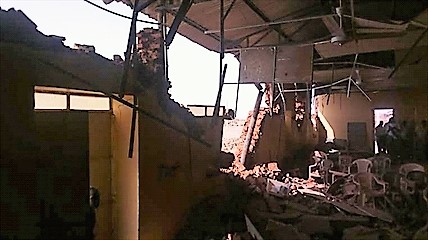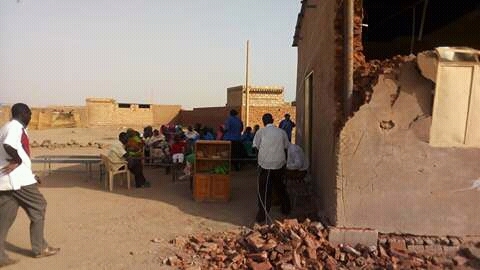
Sudanese government officials demolished the Sudan Church of Christ (SCOC) building in the Soba region, 20km south of the capital Khartoum, on Sunday. Two church members were detained and interrogated but later released.
The two men were arrested by Sudan’s National Intelligence and Security Services (NISS) because they had refused to open the church gates, the charity Middle East Concern (MEC) reports.
The government claims that a week’s notice was given to the church but none of the SCOC leaders said they had been notified about the demolition plan. On Sunday at 2pm Security personnel, including riot police and National Intelligence and Security Service (NISS) officers came in and destroyed the sanctuary, two offices and a centre used for Sunday school.
The SCOC was one of the 27 churches who filed a lawsuit challenging a government order to demolish their places of worship. In late April, Christian Solidarity Worldwide (CSW) reported that the Khartoum Bahri (an area of greater Khartoum) Administrative Court rejected the case. However, as there was a delay in the procedures the lawyers of the churches had not been able yet to register an appeal. The 27 churches belong to denominations including the Catholic, Coptic Orthodox, Sudan Church of Christ, Jehovah’s Witness and Pentecostal Churches. According to the advocacy group, the government aims to “diminish or remove the Christian presence from Sudan”.
Only remaining place
In April local authorities in Omdurman tried to take control of a Christian school run by the Sudan Presbyterian Evangelical Church (SPEC). During a peaceful protest against the government’s actions, a church member was stabbed and died. A few weeks later police and an armed mob arrived to occupy part of the church’s compound.
The government claims the church buildings must be demolished as they have been constructed on land designated for other uses. At the same time, the authorities do not grant permission for new churches to be built, as they say that existing church premises are sufficient for the needs of the country’s Christian minority.
The SCOC building was, however, the only remaining place in Soba al Aradi where Christians could have their meetings, following the demolition of other churches in 2011. Following the demolition on Sunday, the church’s leaders have decided to take legal action against the government. They also plan to address the need for a place where the church community can meet.

During a visit to Sudan in mid-March, the Special Envoy for the Promotion of Freedom of Religion or Belief outside the EU, Jan Figel, raised the issue of the demolition of churches by the Khartoum government, an issue especially since the secession of Christian-majority South Sudan in 2011.
(After this, seven former Sudanese dioceses moved to South Sudan, leaving only two dioceses for the small Christian minority in Sudan, mainly in South Kordofan and Khartoum states.)
The chairman of Sudan’s Legislation and Justice Committee at the National Assembly, Ahmed El Tijani, told Figel that the churches were demolished for land-ownership reasons, and reaffirmed that some mosques have been demolished for the same reason.
However, at the time of Figel’s visit, indications were that the decision to demolish the 27 churches had been suspended. However, last month, as CSW reported, the case for suspension was rejected, with the resultant occupation of the SPEC compound and Sunday’s demolition of the SCOC church.
The EU’s Special Envoy said that the exchanges he had during his visit “demonstrated the readiness of Sudanese partners to engage in continuous and constructive dialogue on religious diversity in Sudan, Horn of Africa and globally”.
Sudan is fifth on the 2017 World Watch List of the 50 countries in which it is most difficult to live as a Christian.